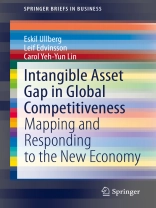This book examines the role of intangible assets (IA) in companies and countries for achieving sustainable economic growth. The authors particularly focus on Sweden and other Nordic countries to analyse the IA gap using a systematized “IA metrics” approach. They also discuss the incentives needed for strategic investments into useful IA to gain national competitiveness from an economic, social and environmental policy perspective.
The authors contend that despite the increasing importance of IA and intellectual capital (IC) in the economy, the current discussion has only been centered on intellectual property, which is one of the more prominent forms of intangibles. As this book demonstrates, IC and IA encompass wider dimensions of human, process, market, and renewal capital, among others. Featuring real case examples from Spotify, Minecraft and Izettle, this book offers a strategy for the resurrection of competitive advantage in the globalized economy and the advancement of some key United Nations Sustainable Development Goals (SDGs).
สารบัญ
Chapter 1. Introduction.- Chapter 2. IC and long-term wealth creation – a national level perspective.- Chapter 3. IC & IA mapping enterprise level.- Chapter 4. Policy implications.- Chapter 5. Discussions of further dimensions.- Chapter 6. Strategic initiatives.- Chapter 7. Postscript.
เกี่ยวกับผู้แต่ง
Leif Edvinsson is Emeritus Professor of Intellectual Capital (IC) at Lund University (Sweden), Chair Professor at The Hong Kong Polytechnic University (Hong Kong) and Co-founder and Founding Chairman of The New Club of Paris (France). Prof. Edvinsson is a key pioneering contributor to theory and practice of IC. Becoming the world’s first director of IC in 1991, he initiated the creation of the world’s first public corporate Intellectual Capital Annual Report 1994, and inspired the development of IC metrics ever since. In 2013, he was awarded the Thought Leader Award by European Commission, Intel and Peter Drucker Association. In 2015, he was appointed Advisory Board to the Japan Innovation Network (JIN). He was also appointed to the Advisory Board of Norway Open Innovation Forum in 2016 and awarded the KM Award in Geneva at the United Nations in 2017.
Eskil Ullberg is Professor of Economics at George Mason University and Director of the Trade in Ideas Program at the Institute for Management of Innovation and Technology (Stockholm, Sweden). Prof. Ullberg is a pioneer in experimental studies of markets in patents and strategy consultant for 20 years. He works on patent markets and teaching finance and economic development classes for 5+ years and is active in the patent market discussions with United Nations, European Commission, World Trade Organization and others. Prior to research and teaching over 20 years of experience as international management consultant in strategy for firms, international organizations and government agencies alike (central bank, patent offices, other) with special focus on management of risk.
Carol Yeh-Yun Lin is a Professor in the Department of Business Administration at National Chengchi University in Taiwan. She received her Ph D in Human Resource Development from the University of Texas at Austin in 1992. Her research interests include strategic human resource management, international human resource management and intellectual capital.












